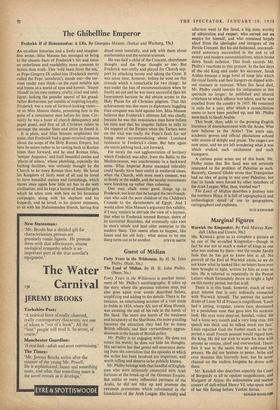Guest of Midian
The Land of Midian. By H. St. John Philby. (Benn, 36s.) Forty Years in the Wilderness is another instal- ment of Mr. Philby's autobiography. It takes up the story where the previous volumes stop, but also goes again over events described before, amplifying and adding to the details. There is, for instance, an entertaining account of a visit made to Jedda in 1924, where Ali, son of King Husain, was awaiting the end of his rule at the hands of Ibn Saud. The more one learns of the weakness and incapacity of the Sharifians, the more puzzling becomes the attraction they had for so many British officials, and their extraordinary aggran- disement at the hands of British policy.
Mr. Philby is an engaging writer. He does not mince his words; he does not hide his thoughts. His narrative has that genial self-assurance deriv- ing from the conviction that the episodes in which the writer has been involved are important, well worth telling and deserve to be publicly known.
Mr. Philby belongs with that handful of English- men who were intimately connected with Arab fortunes at the break-up of the Ottoman Empire. But unlike so many influential partisans of the Arabs, he did not take up and promote the extremist pretensions which culminated in the foundation of the Arab League. His loyalty and affection went to Ibn Saud, a big man, worthy of admiration and respect, who- carved out an empire for himself, and who remained largely aloof from the ideologies and intrigues of the Fertile Crescent. But his old-fashioned, uncompli- cated autocracy succumbed in the end to oil money and modern communications, which broke down Saudi isolation. This book records Mr. Philby's reactions to this process: In the last days of the old King and under his successor, Saudi Arabia became a large bowl of soup into which the royal family and their hangers-on dipped with- out measure or restraint. When Ibn Saud died, Mr. Philby could restrain his indignation at this speatacle no longer; he published and uttered criticisms to which offence was taken, and he was expelled from the country in 1955. He remained in exile for a year, after which a reconciliation seems to have been patched up, and Mr. Philby went back to Saudi Arabia.
This book, then, adds to the growing English literature of disenchantment with the Arabs. Who now believes in the Arabs? Ten years ago, academic groves and official plantations echoed with strains of delight and praise. The singers are now mute, and we are left wondering what it was which evoked such excitement and such transports.
A curious point arises out of this book. Mr. Philby states that Ibn Saud was not seriously interested in the problem of Palestine as such. Recently, General Glubb wrote that Transjordan had no idea of going to war over Palestine, but that its hands were forced by other members of the Arab League. Who, then, wanted war?
The Land of Midian describes a journey into the northern Hijaz. It is full of topographical and archeological detail of use to geographers, cartographers and explorers.
ELIE KEDOURIE


































 Previous page
Previous page